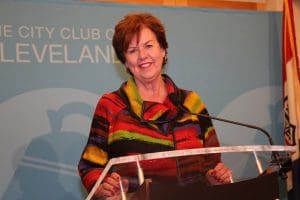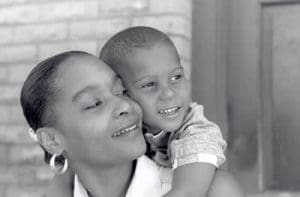STEP Tutoring in Warrensville Heights, March 2018
STEP-Supporting Tutors Engaging Pupils is a volunteer, one-on-one, structured tutoring intervention. It is designed to help build reading and language skills in K-3 students who are reading below grade level. It incorporates a structured reading strategy, trained volunteers and a qualified, onsite site coordinator. STEP can be used in schools, libraries, and community centers.
The Literacy Cooperative first introduced STEP in 2010. Since then, the STEP model has been used by schools in the Cleveland Metropolitan School District, Maple Heights School District, Euclid City Schools, and Warrensville Heights School District.
The Warrensville Heights’ STEP program has taken a unique approach by engaging their high school students to be the volunteer reading tutors. This cross-school connection has built community, given the teenagers a meaningful opportunity, and provided the youth with great role models, all while improving reading levels.
Warrensville first became interested in the STEP program three years ago, but didn’t have the tutor base they needed to introduce the program. When they considered they could recruit their high school students as tutors, they launched in 2015. This arrangement works perfectly since all of their schools are within a 3 mile radius and the district’s transportation department can take the high school students to and from the elementary school. They have focused on high school students who have electives during the same time the elementary students have recess.
Warrensville Heights School District recognizes that this program supports classroom literacy instruction and reading comprehension, but it also enhances social-emotional learning and attendance. Roxann Lozar, Primary Academic Coordinator says, “Having high school students as tutors has been a tremendous benefit because our elementary students see them as role models. I remember the first time the HS tutors came to the elementary building. All the children, not just the ones in the program, were in such awe of “the big kids” being in the building. We had cheerleaders, basketball and football players as tutors and this really sparked a lot of students’ interest.”
The program has had measurable success too. Warrensville Heights is targeting students that are within the 25-40 percentile range as measured by NWEA (Northwest Evaluation Association) MAP assessment. In the 2015-16 school year, Warrensville Heights’ STEP program targeted first and second grade students. For the 2016-17 and 2017-18 school years, they are working with just second grade students.
During 2015-2016, focused on second grade, STEP supported 18 students reading below grade level. The NWEA fall testing results were used to identify the 18 students. One hundred percent of the students who participated in the program made growth from fall to spring. One student made three years’ worth of growth. During 2017-2018, 31 second grade students participated in the program. 97% (30 students) made growth and 3% (1 student) showed flat growth from fall to spring as measured by the NWEA. 29% of the students ended the program reading above grade level.
Ms. Lozar credits having the qualified, onsite STEP Coordinator as the reason the program has done so well. Their coordinator maintains the program, schedules and trains the tutors, collects and monitors the data, and is present to answer volunteer questions and advise while the tutoring is taking place.
Contact Bob Paponetti to learn more about the STEP model.


 As we each do our part to improve literacy in our community, more and more we see the need to coordinate and align our services. Literacy cuts across all sectors and spans a lifetime. From employers to clinics and schools, for children and adults, we need to focus our efforts on improving the skills of the whole family in all aspects of life. It’s a big commitment, but one we can do together.
As we each do our part to improve literacy in our community, more and more we see the need to coordinate and align our services. Literacy cuts across all sectors and spans a lifetime. From employers to clinics and schools, for children and adults, we need to focus our efforts on improving the skills of the whole family in all aspects of life. It’s a big commitment, but one we can do together.